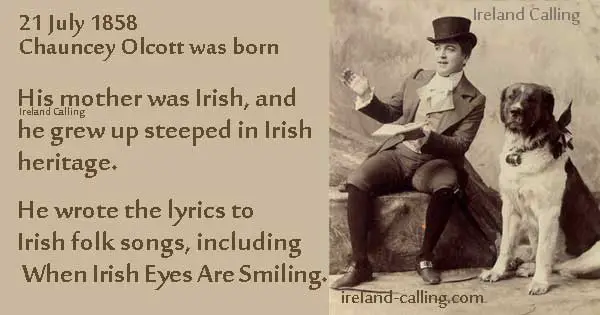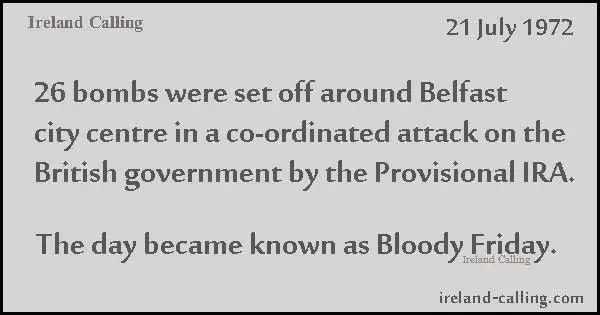july-top.html
1858 Chauncey Olcott was born in Buffalo, New York on this day in 1858. His mother was from Cork, and he grew up well in touch with his Irish heritage. He studied in London before returning to America and becoming a Broadway star. Olcott was an esteemed actor, singer and writer and worked with many of the leading performers of his era.
However, undoubtedly his most famous work was his songwriting, which included popular Irish folk songs My Wild Irish Rose, Mother Machree, and most famously When Irish Eyes Are Smiling.
 Click here to learn more about the song When Irish Eyes Are Smiling
Click here to learn more about the song When Irish Eyes Are Smiling
* * *
1928 John Keane was born in Listowel, Co Kerry on this day. He was a writer who was the first recipient of a prestigious PEN award in 1999. The ceremony began in 1999, to honour a playwright, poet, novelist or writer that had made a significant contribution to Irish literature. Since Keane won the first in 1999, esteemed Irish writers such as Edna O’Brien, Seamus Heaney and Maeve Binchy have been honoured.
Click here to read about more great Irish writers
* * *
1964 Happy birthday to Steve Collins, born in Dublin on this day in 1964. Collins is a former world champion boxer. He was known as the ‘Celtic Warrior’ and his performances in the ring well justifies that tag. Collins is a legend of Irish sport, after some epic fights during the 1990s, most notably against British fighters Chris Eubank and Nigel Benn.
Click here to read about more top Irish sports stars
* * *
1972 On the 21st July 1972 26 bombs were set off around Belfast city centre in a co-ordinated attack on the British government by the Provisional IRA. Eleven people were killed in the explosions and more than a hundred were injured, some severely disfigured by the blasts. The day became known as Bloody Friday.

The day’s events followed a breakdown in negotiations between the IRA and the British government. The IRA wanted Britain to remove its forces from the streets of Belfast by 1975, and to release republicans from prison. The British refused to these demands and the IRA called an end to an existing ceasefire.
What followed was the extreme violence of Bloody Friday. The 26 bombs were all detonated within an 80 minute period from 2.10pm to 3.30pm. The destruction to the city was immeasurable, and hundreds of innocent civilians were caught up in the explosions. The operation was carried out by the Belfast Brigade of the Provisional IRA, led by Brendan Hughes.
Years later, he was interviewed about the day’s events:
“I was the operational commander of the ‘Bloody Friday’ operation. I remember when the bombs started to go off, I was in Leeson Street, and I thought, ‘There’s too much here’. I sort of knew that there were going to be casualties, either because the Brits could not handle so many bombs or they would allow some to go off because it suited them to have casualties. I feel a bit guilty about it because, as I say, there was no intention to kill anyone that day. I have a fair deal of regret that ‘Bloody Friday’ took place. A great deal of regret. If I could do it over again I wouldn’t do it.”
In the aftermath the IRA claimed that they had given between 30 and 60 minutes warning to the authorities before each bomb was detonated, so that innocent civilians could be cleared from the sites. However, only a handful of the detonation sites were successful evacuated before the blast.
The IRA claimed that the authorities deliberately ignored some of these warnings because they wanted some casualties in order to strengthen their political sympathies from the public.
The police said they had little chance to efficiently evacuate all the sites because of the short time period in which all the bombs went off, and the panic and chaos that was caused.
Thirty years after Bloody Friday, the IRA officially apologised for the injuries and deaths caused to civilians in the bombings.
* * *
1975 Happy birthday to Cara Dillon, born in Londonderry on this day in 1975. She is a talented singer and songwriter and regularly performs with her husband Sam Lakeman.
The couple met when Dillon joined Lakeman’s band Equation in the mid-1990s. The band also included Lakeman’s two brothers Sean and Seth and Kathryn Roberts. The band enjoyed moderate success, but are considered by many as one of the unsung talents of the folk music scene, with all the members going on to have successful careers as solo artists or in new groups.
Click here to read about more great Irish singers
* * *
1976 Christopher Ewart-Biggs was killed on this day in 1976 by an IRA bomb in Dublin. He was the British Ambassador to Ireland and was targeted by the Provisional IRA during the Troubles.
He had only been in Dublin for two weeks at the time of the attack. Ewart-Biggs knew that he was a potential target for the IRA and had tried to take precautionary measures such as varying his routes around the city.
However, there were only two routes available from his residence to the main road, and his vehicle drove over a land mine on 21st July 1975. The explosion killed Ewart-Biggs and fellow Civil Servant Judith Cooke. Two other passengers in the car survived the explosion.
A major manhunt was ordered with 4,000 Gardaí and 2,000 soldiers searching to find those responsible. Taoiseach Liam Cosgrave said: “This atrocity fills all decent Irish people with a sense of shame.” No-one was ever convicted of the murders.
july-bottom.html